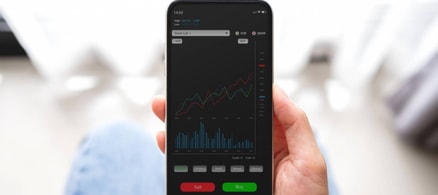The case for dollar-cost averaging

Orman, a best-selling author and TV personality, says dollar-cost averaging (DCA) “puts time, your money and the market on your side.”
You might already be using DCA through a work retirement plan, like a 401(k), with a portion of each paycheck going into the account. And some popular investing apps allow people to use the same approach by setting up automatic deposits each week.
Say you decide to invest $100 per month into Gap stock. Today, that might buy four shares — but with DCA, you don’t make decisions based on how many shares you’re getting.
If the price crashes by 50% next month, that $100 can now buy eight shares. Sounds like a bargain! And if the price doubles instead? To offset the risk of buying too high, you’re now making a conservative purchase of only two shares.
“In times where the markets are very confusing and they're going up and down ... if you dollar-cost average and the markets go down and eventually the markets start to come back up again, you will make more money, most likely, than if you invested in one lump sum,” Orman said last year on her Woman & Money podcast.
A new study, however, says it doesn’t usually work out this way.
Meet Your Retirement Goals Effortlessly
The road to retirement may seem long, but with WiserAdvisor, you can find a trusted partner to guide you every step of the way
WiserAdvisor matches you with vetted financial advisors that offer personalized advice to help you to make the right choices, invest wisely, and secure the retirement you've always dreamed of. Start planning early, and get your retirement mapped out today.
Get StartedQuick off the starting block

By sitting on extra cash for longer than necessary, Northwestern Mutual says, investors using DCA miss out on the growth that comes with more time in the market.
First, the financial services company looked at the rolling, 10-year returns of a $1 million investment in U.S. markets. Then it looked at how much you would make if you had spread that $1 million investment evenly over 12 months before waiting for the remaining nine years.
The company found that investing $1 million all at once generated better returns at the end of 10 years than dollar-cost averaging almost 75 percent of the time. That’s regardless of asset allocation.
“Essentially, the data support the adage: Time in the market beats timing the market. Investing (a) windfall immediately allows an investor to capture returns with all of their capital at the outset,” the report says.
In fact:
- With a 100% fixed-income portfolio, lump sum investing outperformed dollar-cost averaging 90% of the time.
- With a traditional 60/40 split, lump sum investing won 80% of the time.
- And with a 100% stock portfolio, lump sum investing outperformed 75% of the time.
“Observations where lump-sum investing outperforms are associated with markets that trended higher over time, while dollar-cost averaging outperformed when the implementation occurred during markets that were trending lower,” the report says.
“Historically, there are more years where markets trend higher, which also leads to lump-sum investing outperforming.”
So what’s the right move?

While history seems to support one investing style, the choice between lump sum and DCA isn’t an obvious one.
“Considering only historical data when making this investing decision ignores the behavioral and emotional side of investing,” says Matt Wilbur, senior director of advisory investments at Northwestern Mutual.
If the fear of investing a lot of money at once is keeping you from investing at all, you might benefit from the slow and steady method. DCA also beats holding on to your cash while you wait for a “good time” to invest, the study says.
And despite Orman’s passion for dollar-cost averaging — she even has a DCA calculator on her website — the financial guru acknowledges she would have recommended going all in back in 2007 and 2008, when the markets were crashing.
“But we're in uncertain times right now. So, if you don't know what to do, this is a way for you to invest, and in the long run, probably come out further ahead, especially if the markets are volatile,” she says on her podcast.
Stop overpaying for home insurance
Home insurance is an essential expense – one that can often be pricey. You can lower your monthly recurring expenses by finding a more economical alternative for home insurance.
SmartFinancial can help you do just that. SmartFinancial’s online marketplace of vetted home insurance providers allows you to quickly shop around for rates from the country’s top insurance companies, and ensure you’re paying the lowest price possible for your home insurance.
Explore better ratesPut your strategy into action

Keep in mind, the decision about whether to use lump sum investing or DCA only applies if you actually have a lump sum to invest.
If you do, make sure to spread your big investment around to minimize risk. Check out one of today’s popular robo-advisors if you’re not sure how to craft a well-balanced, diversified portfolio.
If you prefer the advantages of dollar-cost averaging, or you don’t have a lot of money to spare right now, plenty of investment apps allow you to automate small, regular investments.
Some of these apps offer “fractional trading,” which allows you to buy portions of expensive shares like Apple or Tesla, no matter how small your monthly deposit is.
Another option is to choose an app that invests your “spare change,” rounding up day-to-day purchases to the nearest dollar and investing the difference.
Sponsored
Follow These Steps if you Want to Retire Early
Secure your financial future with a tailored plan to maximize investments, navigate taxes, and retire comfortably.
Zoe Financial is an online platform that can match you with a network of vetted fiduciary advisors who are evaluated based on their credentials, education, experience, and pricing. The best part? - there is no fee to find an advisor.








